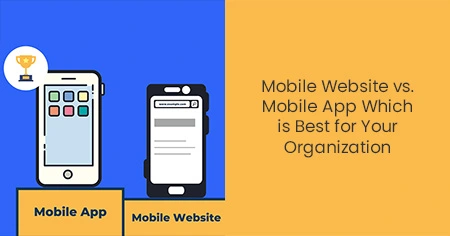Some stunning stats and figures:
- Statista estimates that by the end of next year, at least 187.1 million people will have purchased a smartphone.
- In 2022, the average user spent 3 hours and 47 minutes on a mobile app, while the time spent on a website dropped to 23 minutes.
- In 2019, mobile apps generated more than $460 billion in revenue. By 2023, earnings are expected to reach approximately $950 billion.
- Customers' time on their mobile devices is significantly in favour of applications. Mobile applications account for 90%, with mobile websites accounting for 10%.
- Apps have three times the conversion rates of mobile-optimized websites and up to 1.5 times those of desktop web browsers.
Businesses must have a strong presence on mobile devices like smartphones, tablets, and digital watches. On the other hand, there are numerous ways to connect with mobile audiences, making it difficult for entrepreneurs to choose the right platform. There has been a long debate on mobile websites vs. mobile apps, and if you haven't been living in the cave for the last few years, you should be well aware of the difference between web and mobile applications.
This blog post will discuss the benefits and differences between a Mobile Website and a Mobile App to help brands find the right option for their business.
What is a mobile app?

A mobile app is a software that runs on mobile devices. Mobile apps can be downloaded and installed from the Google Play Store or the Apple App Store. They provide users access to various digital services such as social media, gaming, online shopping, productivity tools, and news, allowing them to stay connected and informed.
Benefits of mobile app development:

A mobile app can benefit from easy accessibility to improved user experience. Below is a list of a few benefits of a mobile app.
- Enhanced convenience
- Content and recommendations that are tailored to your preferences.
- Push notifications are used to deliver timely updates.
- Build a stronger brand
- Essential features can be accessed offline.
- Increase customer loyalty
- Offer unique services
- Camera, GPS, and location are all integrated into a smartphone.
- Encourage users to make purchases within the app.
When Do You Need a Mobile App?

When more than half of the world's population uses mobile devices, having a business mobile app
- Better reaching more customers.
- Enhancing your brand awareness and customer loyalty
A customized mobile app allows you to offer your valued customers all of your products or services at any time and from any location. With certain user-friendly features, you can provide your users with a more personalized and convenient experience. A mobile app tailored to your business allows you to collect critical data and feedback to improve your marketing strategies.
What is a mobile website?

A mobile website is a modified version of a website designed for mobile devices. It has a responsive layout designed for smaller screens and touch-based interactions. Mobile websites load quickly and provide a better user experience on mobile devices.
Benefits of Mobile Website:
The mobile website brings many benefits to users as well as business owners. Such as;
- more audience engagement potential and reach.
- increased visibility in search results
- enhanced tracking tools and user statistics
- Improved accessibility on many mobile devices
- lower expenses for development and maintenance
When do you Need a Mobile Website?
A mobile website can help
- • Businesses reach more customers
- • Increase lead conversions and
- • Improve user experience
Furthermore, it improves your SEO ranking, which results in more Google favours because the search engine prefers mobile-friendly websites.
Similarities between App and Website:
A website is an online representation of your company. Users can access it through any web browser; it looks great on desktop computers and laptops. A mobile app is intended for use on tablets and smartphones. Mobile and websites apps can be used for the same purposes, such as marketing, reaching out to new customers, providing information about your company or products, etc.
Which is a better option for your business?
It is difficult to answer this question without more information. For example, if you are looking for a mobile app, consider its purpose. If you're looking for a website, consider what type of website you want and how users will use it.
Mobile apps are great for some businesses because they enable customers to access services while on the go. This is especially true when people want to purchase or download content on their phones. Websites remain relevant because they can serve as an online store and provide more information than a mobile app in the same space. A mobile app and a website are both excellent options for your company. Knowing when to invest in one is critical to their shared success.
Let us look at the key difference between mobile apps and mobile websites:

| Mobile apps | Mobile Website |
|---|---|
| Works well offline | Limited offline functionality |
| Requires development of separate version for each platform | Displays equally well on all types of devices |
| Provides wider options for personalization | Provides average opportunities to personalize settings |
| Accessible on tablets, mobile phones, wearables, and TVs. | Accessible on tablets, mobile phones, wearables, TVs, and even workstations and desktops of all kinds. |
| App store search. | App store search. |
| Provide a service and dynamic content to end-users. | Provide information and other static content to visitors. |
| Requires owners to pay some time and extra cost for regular updates and maintenance. | Update and maintenance, as compared to mobile apps is easier and less expensive. |
Conclusion








